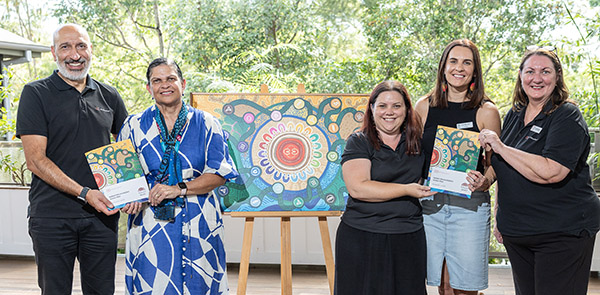
Early childhood educators have a wonderful and unique opportunity to support children's cultural identity and promote understanding and respect towards cultural diversity.
The creation of a Reconciliation Action Plan (RAP) is a key way early childhood education and care (ECEC) services can show their commitment to reconciliation and creating a culturally safe environment.
Elder Aunty Merle Cashman, a Nguigi woman from Quandamooka Nation and Kuunju from the Thipan people, is passionate about working with ECEC services to understand the importance of making sure a RAP is more than just a strategy document.
'A Reconciliation Action Plan is a commitment to Aboriginal people, and Torres Strait Islander people, to embed their perspectives across both your professional and personal life,' Aunty Merle said.
'When introducing a Reconciliation Action Plan into a service it is important that this is not just an acknowledgement, but rather an understanding by all staff of exactly why it is being introduced and what a real difference it can make to closing the gap.'
Individualising the service commitment
Like many ECEC services across Queensland, Kindy Patch Grovely in Keperra is proud to embed Aboriginal and Torres Strait Islander practices throughout their learning.
The service developed, drafted and refined their RAP in strong consultation with Warra Culture in Community cluster.
Warra Culture in Community cluster, 1 of 4 local community clusters co-ordinated by the Department of Education in Metro North region, is designed to build cultural safety and support embedding for Aboriginal and Torres Strait Islander perspectives in ECEC services.
From creating an Acknowledgement of Country with the children, using traditional language, learning about and sharing dreaming, and caring for Country, embedding Aboriginal and Torres Strait Islander practices is now part of the daily routine at Kindy Patch Grovely.
G8 Education also recently celebrated their newly developed organisation-wide RAP.
Their RAP Champion and Chief Education and Learning Officer Ali Evans said although many centres across the G8 Education network already have individualised plans for centres, it was important for the organisation to have a Reconciliation Action Plan as well.
'It's so great to launch this Reconciliation Action Plan, but the best thing about it is that now we can start moving ahead.' Ms Evans said.
Kindy Patch Grovely teacher Nemika said the team were led by the children in exploring Aboriginal culture and Torres Strait Islander culture, and worked closely with local elder Aunty Merle Cashman to develop the services RAP and to ensure their service was a culturally safe environment.
'It's part of what we do every day now, and whatever we are learning about, we try to include an Aboriginal perspective and Torres Strait Islander perspective,' Nemika said.
'We have made some really important connections with local groups and we check in with them regularly when it comes to embedding this learning in our centre.' she said.
Now more than ever
There is a strong commitment and specific regard to supporting the inclusion of Aboriginal culture and Torres Strait Islander culture in early learning.
This commitment is particularly highlighted in the latest rendition of the approved learning framework—Belonging, Being and Becoming: The Early Years Learning Framework for Australia (EYLF) V2.0 (PDF, 24.5MB).
Reconciliation Week is coming up from 27 May to 3 June with the theme this year—'Now More Than Ever'.
There are a number of meaningful ways ECEC services can take action both during this important week, and at all times throughout the year.
- Helping ensure children have access to early childhood education and care that respects their family, culture and other identities and languages, which is reflected in the:
- Ensuring that your service has engaged with its local Aboriginal community and Torres Strait Islander community in the development of a reconciliation action plan. This plan provides a framework to get started on your reconciliation journey, and should lead to concrete steps being taken. It should reflect the needs of your community and be reviewed regularly.
- Building staff awareness through professional development opportunities.
- Beginning meetings and events with an Acknowledgement of Country.
- Organising a reconciliation wall at your service or in your community and invite families and staff to write what reconciliation means to them and identify at least one action they might undertake to contribute to this ongoing journey of reconciliation.
- Finding out more about our shared histories, cultures and achievements, and exploring how each of us can contribute to achieving reconciliation in Australia.
- Sharing a story and increase your library resources. The department's Dandiiri Schools and Community Library is open to the public, and has a comprehensive collection of resources reflecting Aboriginal and Torres Strait Islander culture, history and politics. Phone (07) 3714 8500 or email dandiiri.library@qed.qld.gov.au for further details.
Related resources